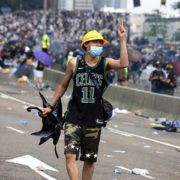It all started like a play, and as in any play, there should be a leading actor. In this case, she was more than an actor; she was a star, in fact China’s superstar, the lady everybody admired, dreamed of, and the most beautiful face of China at home and abroad, Fan Bingbing.
She disappeared over last summer and resurfaced some four months later, in October, after paying the staggering amount of 884 million RMB in fines to avoid criminal prosecution for tax evasion.
The message was clear to all of those concerned: if the tax bureau could go after a superstar rubbing elbows with the mighty and powerful of China and all over the world, nobody was safe. In fact, since then apparently all of China’s film industry is under investigation for tax evasion, and inspectors are finding producers, directors, and actors guilty of dodging the taxman for years.
Officials have allegedly denied it is widespread campaign against all sectors of society and claim this is targeted only against the entrainment industry, that for decades paid nothing of its dues to the state. In fact, in 2018 the government cut taxes on small private enterprises, and so far there is no sign of a far-ranging hunt for tax evasion, but a sentiment of fear seems to be sinking in. Yet officials of the Chinese Internal Revenue office probing into the coffers of glamorous actors sent waves of panic rippling throughout society.
If the dazzling and glitzy screen world is rattled into surrendering part of its earnings to the state, then the rest of the world will also be called on to yield its dues, sooner or later, or so many rich people in China think. Could it be that entrepreneurs, professionals, and anybody who made money in the past decades is or will be asked to pay his or her taxes?
This is all well and good in any society, but this is China. Here almost exactly 30 years ago, after the crackdown on the students’ movement in Tiananmen on June 4, 1989, the state de facto cut a deal with the young Tiananmen demonstrators: you can make money and not pay taxes, but don’t get involved in politics—i.e. no representation, then no taxation.
However, now the state is knocking on their doors asking for taxes, still without representation. The old social deal is cancelled, and what is the new deal? It could be taxation without representation. After all societies went on like this for centuries in the past—why not now? Simply because if someone is taxed without having ways of controlling how his money is spent and without his agreeing to it, he will have little or no incentive to make more money. He will work less, risk even less, vote with his feet (and cash), and try to move his business and fortune out of China.
Taxes without democracy? Bad deal
In many ways, the demand of the Chinese taxman was and is bound to happen.
Over a decade ago I wrote about it (see China: In the Name of Law. A New Global Order, “China’s Inevitables: Death, Taxes—and Democracy,” first published on La Stampa in June 2007) that around 2020 China would have to face a credit crunch to service its growing demand for social security and its burgeoning payments to service its bold infrastructure projects. The tax onslaught just took place a couple of years earlier than we expected. The variation depends on the still ongoing anti-corruption campaign.
The campaign was designed to challenge the thriving corruption in the administration and in State-Owned Enterprises, SOEs, which grew more inefficient since they were reformed in the second half of the 1990s. But this was part of a vice maneuver: on the one hand, a crackdown on the corrupt officials, and on the other, reform of SOEs. The second arm of the vice didn’t work. SOEs have proved very hard to change also because despite some official rhetoric, private entrepreneurs still live under a shadow. Any of them can be picked up for past economic crimes (see also) because rules and laws have not been changed. The old way of doing business under political patronage is gone, but SOEs are still there and not being privatized, and a new legal and transparent way of doing business has not arisen.
This has led businessmen to be less active, and so are officials (for decades, de facto entrepreneurs in their own right) who have no incentive (yes, they can no longer receive kickbacks) and even have disincentives (possible investigation) if they are proactive. So, the economy slowed down.
This meant less revenue for the state, which had to come up with an alternative, taxing the rich. This is especially true since after the 2008 financial crisis the central and local governments ballooned their debts to artificially finance growth.
All of this has been exasperated by the growing trade tensions with the US, which could fell China’s foreign commerce accounting by about 50% of the GDP. US commerce accounts for about 25% of its GDP.
The obvious solution to this complex entanglement would be a legal overhaul with clear “amnesty” of some sort for businessmen, privatization of SOEs, and some form of political accountability for the money the taxman wants. Without all of this, under the combined pressure of these elements, the economy will further slow down. Then, even common people, who are happy with the crackdown on corruption and on rich tax dodgers, will suffer and turn against the leaders. Of course, Chinese people are very meek, forms of social and political control are far reaching and sustained, organized protests leading to uprisings are still very far away, but the social compounds are mixing right now.
Tiananmen’s ghosts return
Is the Chinese leadership aware of this? Have Chinese leaders stumbled in all of this, or was there a design to force the situation into some kind of democratic reform? Actually, as always in politics, original intentions are irrelevant. What is happening is that officials and businessmen are disgruntled, and for different reasons, common people might also become unhappy in the coming months or years. The present US trade tensions are just the tip of a massive iceberg of wide-ranging dissatisfaction. Then, 30 years of social peace after Tiananmen is coming to an end and a reckoning. Either China boldly starts massive market and political reforms or its economy could shrink, angering all layers of society.
These reforms would be extremely risky and the outcome would be uncertain. But certainly, if the steps are not taken, the outcome could be very unpleasant.





